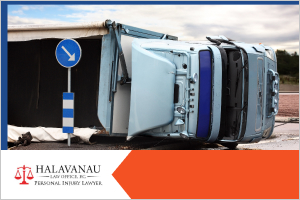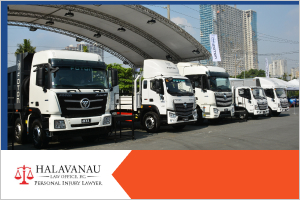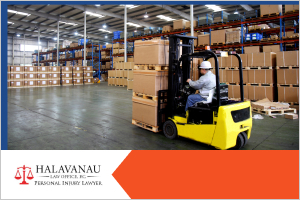
Businesses and manufacturers are under increased pressure to curb delivery time in the consumer-driven market. And so, the trucking industry has grown tremendously prominent on the roads. In 2019, a total of 176,412 large truck accidents were recorded. Unfortunately, 81,272 resulted in severe injuries, and 5,074 resulted in fatalities. Furthermore, 71% of the victims killed nationwide were occupants of other vehicles. In 2020, a total of 156,882 large truck accidents were recorded, 68,348 of which resulted in injuries and 4,608 in deaths. The statistics suggest that there are about 460 accidents, 240 injuries, and 14 deaths every day on average.
Accidents are inevitable, and they can happen when we least expect them. Truck crashes can be one of the most devastating types of accidents due to the truck's size and weight. A truck collision is often severe and complicated and can inflict life-changing, serious injuries. Many trucking accident victims are left with lifelong disabilities. They also face exorbitant medical bills, loss of earnings, and emotional damage. However, victims are not left without a choice. They can pursue compensation to cover their losses from negligent truck drivers, trucking companies, and manufacturers.
But, obtaining compensation is not a piece of cake. This is also true for determining fault in a truck accident. Before victims can recover damages, the burden of proof is on their shoulders. But, in a truck accident case, there can be multiple potentially liable parties. And this fact complicates the matter.
Fortunately, the law is always on the side of the truck accident victim. So in this blog, we laid out how fault is determined in a truck accident, who can be potentially at fault, the importance of hiring a truck accident attorney, and the negligence laws that may affect your ability to claim compensation.

Truck accident victims have an option to seek help from a personal injury attorney. These professionals are well-versed in personal injury laws that are too complicated to understand by most people. Hiring them is one of the most important and helpful decisions that you can make. They can help you determine fault in your truck accident case by employing a separate investigation of your case. This investigation will include:
Suppose they have already established that the other driver's negligence causes your accident. In that case, they can demand compensation for your damages. They have to document your expenses and losses associated with your accident to do this. This is done by:
Driving fully loaded commercial trucks is a challenging occupation that requires skills and precision. Before truck drivers can drive these large trucks, they must be duly licensed and appropriately trained to drive safely. When an incompetent truck driver hits the road, they may cause fatal truck accidents.
Usually, truck drivers are to blame for several truck accidents on the road. However, with the help of your truck accident attorney, the following can be held liable for the accident:

In most accident cases, the driver faces immediate blame. This is chiefly true for commercial truck drivers. They are trained to handle tractor-trailers and are under rules and regulations that are more extensive than those for other motorists.
Driver error is the most common cause of trucking accidents. This may include:
Truck drivers must also inspect their trucks and cargo before hitting the road. Failure for inspection can result in mechanical malfunctions and failures leading to an accident. Unsecured loads increase the driver's risk of losing control leading to truck jackknifing or tipping over accidents. When proven that they fail to do these preventive measures, they can be liable for the collisions. It falls under a breach of duty which is one of the main factors in apportioning fault.
Aside from the truck drivers, trucking companies can also be held responsible for the accident. Some semi-truck drivers work as independent contractors. In cases like this, victims are limited to bringing truck accident claims against negligent truck owners or operators.
Many truck drivers are hired by trucking companies to transport cargo. The driver's employment status can have a big impact on your claim. Suppose the driver was driving the truck within the scope of their job when the accident occurred. In that case, the employer may also be held accountable for your damages.
Truck employers are legally liable when their employees cause injury to another. Truck companies know this, and they will try to avoid liability by misclassifying drivers as independent contractors.
With the help of truck accident lawyers, the employer's liability for the accident can be established. They possess the knowledge and resources to probe into employment records to determine that the at-fault driver is an employee. They can also investigate the company records to identify other types of negligence that contributed to the accident. These negligent acts may include:
Trucking companies will try their best to deny or undercut accident claims. They have company and insurance representatives who will try to offer victims a low settlement amount. This is why you must have a truck accident lawyer by your side to level the playing field. Hiring a lawyer is tantamount to protecting your legal rights and justice.

Companies designing, manufacturing, and selling semi-trucks and parts are obliged to ensure their components and vehicles are safe and functioning according to industry standards. Failing to fulfill their obligations can cause mechanical failures resulting in fatal accidents.
Bringing a claim against a truck manufacturer entails proving that a truck or one of its parts was defective. This necessitates an intensive investigation of the rig. But, most trucking companies take possession of the rig right after an accident.
Fortunately, with a truck accident lawyer's aid, the carrier can be requested to preserve the truck for independent inspection. Automotive engineers will investigate the truck and trailer for possible defects and give expert testimony on how a faulty part or a substandard design should work.
Many commercial truck accidents were caused by mechanical failures, which resulted from negligence in maintaining the truck. This may fall into owner-operator negligence. But there are also cases when the truck's malfunction was caused by negligent service or repairs. In this case, liability will fall upon the service provider or mechanic who did the service maintenance work.
Regarding defective trucks, inspection is crucial to determine if a truck was maintained properly before the accident. Repair and maintenance records must also be scrutinized to determine if scheduled services have been neglected. Expert testimonies can establish fault concerning how the truck's condition differs from what makes up safe working order for semi-trucks.

Semi-trucks should be loaded appropriately to ensure the cargo is secured and balanced. The driver and the loading company share this responsibility. The driver has a duty to inspect the cargo in the course of a haul.
Excess loads and unevenly distributed weight are also some of the most common causes of truck accident cases. Liable parties can be the shipping company for negligently loading the truck, the truck driver for negligently failing to inspect the load, or both the shipping company and the driver.
Determining what exactly happened right after a truck accident is often challenging. It needs a comprehensive investigation to establish that one or multiple parties may be at fault.
Suppose the truck driver lost control of the truck due to another driver's recklessness, such as drifting between lanes or cutting off the rig. It might lead to a crash with the other vehicle, or it could be a near miss leading to the victim's accident. In that case, the victim can file a personal injury claim against the driver of another vehicle.
Roadway hazards are also another potential cause of motor vehicle accidents. Highways and roadways that are commonly trafficked often sustain major damage that can result in accidents if not properly maintained or designed. Personal injury attorneys can identify which government agency is in charge of road maintenance and can take legal action on your behalf if a road defect leads to a truck collision.

A truck accident lawsuit commonly involves a claim of negligence. Negligence describes a situation where a person acts negligently, resulting in injuries or property damage. When an accident results in injuries, death, or property damage, the question is, "Who was at fault?"
All states follow different principles of comparative fault. When multiple parties are believed to be liable, the jury will apportion liability to all parties and other responsible people. But the question is, "Who will pay for the damages?" Different states use different rules as regards "joint and several liability."
Here are the three negligence rules practiced nationwide:
Pure contributory negligence provides that if someone acted negligently or contributed slightly to the accident, they could no longer recover damages and are considered at fault. In this rule, a plaintiff is barred from recovering damages even if they are only 1% or more at fault for a crash. However, this rule can be disputed if the victim can prove fault that the defendant was knowingly negligent or willfully destructive.
This system usually leads to harsh results. It necessitates total innocence on the plaintiff's part. Fortunately, only a handful of states employ this rule, such as Maryland, North Carolina, Alabama, and Washington, D.C.
As opposed to contributory negligence, the pure comparative negligence system allows the plaintiff to obtain damages even if they are 99% at fault for the accident. In this case, the plaintiff can recover 1% of the damages from the defendant. So, in other words, the plaintiff's damages will be calculated, then reduced to their percentage of the fault.
There are 13 states that utilize a pure comparative negligence system, such as Alaska, California, Florida, New York, Arizona, Kentucky, and Rhode Island.
Contrary to a pure comparative negligence rule, modified comparative negligence restricts the plaintiff from recovering damages if they are found at fault beyond a specific percentage. In this rule, a plaintiff is barred from recovering monetary compensation if they are 50% or more at fault. So, in other words, a plaintiff must only be 49% or less at fault.
Some of the states that utilize this rule are:

Are you or your loved one injured in a truck accident? You may have a lot of questions and worries in your head. Truck accidents are no joke, and they can seriously inflict injuries on you that may put your physical, emotional, and financial aspects in jeopardy. Know that there is still a silver lining for you.
Hiring a truck accident attorney can save you from all the burdens the accident may bring to you. Personal injury lawyers can handle your case on your behalf. They are skilled in personal injury laws. And having them on your side can level the playing field.
Being involved in a truck accident is a life-changing and traumatic experience. It should be your priority to recover physically, mentally, and emotionally. Suffering from severe injuries can make you overwhelmed about paying your medical bills.
Insurance companies will try hard to lowball your settlement or even deny the claims. They will pressure you to sign an easy and quick settlement. When you sign a quick settlement, they can save hundreds of thousands of dollars. Before signing anything, you need a truck accident lawyer who can provide you with professional legal advice.
Feel free to contact a truck accident lawyer at (415) 494-8535 for a free consultation or free case evaluation.
Search Our Site
Request Your Free
Confidential Consultation